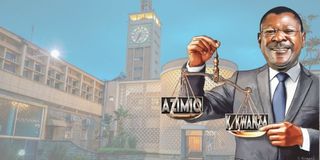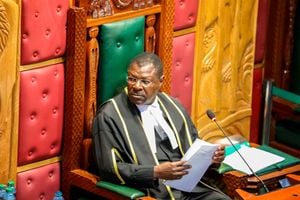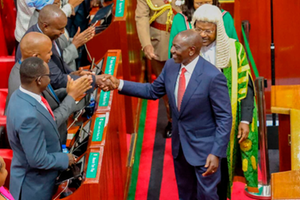
National Assembly Speaker Moses Wetang’ula in a communication to the House, ruled Kenya Kwanza the majority side in the National Assembly with 165 MPs and Azimio la Umoja One Kenya Coalition the minority with 154 MPs.
National Assembly Speaker Moses Wetang’ula is a man on the spot as his Wednesday ruling that overturned a court judgment stretches the House’s unpopular decisions that have set Parliament on a collision course with the Judiciary.
Speaker Wetang’ula in a communication to the House, ruled Kenya Kwanza the majority side in the National Assembly with 165 MPs and Azimio la Umoja One Kenya Coalition the minority with 154 MPs.
The court ruling delivered on February 7, 2025, had annulled Speaker Wetang’ula’s October 6, 2022 communication to the House that recognized Kenya Kwanza as the majority side in the House.
What Azimio and other Kenyans expected was for the Speaker to recognise it as the majority side.
The fact that Azimio, whose anchor party ODM has a working arrangement with President William Ruto’s administration, bitterly protested the declaration to the extent of storming out of the chamber and threatening to de-whip its MPs from the House Business Committee (HBC) among other committees of Parliament, is indicative of no love lost.
This even as Makueni County Governor Mutula Kilonzo Jnr, a lawyer, accused Speaker Wetang’ula of turning himself into a Court of Appeal and overturning the High Court Judgement noting that Speaker Wetang’ula’s ruling is not too common.
“Speaker Justin Muturi had the same tendencies. This habit prompted the Supreme Court to affirm that its advisory is binding on every person,” said Governor Kilonzo Jnr.
He said that parliament is not an absolute entity and that the principle of separation of powers applies.
“The judgement of the High Court on this matter is binding and cannot be questioned unless on appeal. Mr Wetang’ula has in the past argued as much when he was minority leader and Senator of Bungoma,” the governor said.
He added that the jurisdiction of parliament is subject to review by the high court.”
The three-judge bench of Justices John Chigiti, Lawrence Mugambi and Jairus Ngaah ruled that the Speaker violated the constitution.
The Judges noted that there was no evidence that Movement for Democracy and Growth (MDG) of Ugenya MP David Ochieng, Mandera Senator Ali Roba’s United Democratic Movement (UDM), Senate Speaker Amason Kingi’s Pamoja African Alliance (PAA), Chama Cha Mashinani (CCM) of former Bomet governor Isaac Ruto, and Maendeleo Chap Chap, formerly led by Labour Cabinet Secretary Alfred Mutua, that Mr Wetang’ula had claimed to have left Azimio and joined Kenya Kwanza Alliance in his October 6, 2022 communication had made steps to comply with the Political Parties Act.
The Act required them to sign a post-election agreement with the Kenya Kwanza coalition but they did not.
"By assigning the 14 MPs from MDG, UDM, PAA, CCM and MCCP to Kenya Kwanza Alliance without evidence of post-election agreements or justification and declaring Kenya Kwanza Alliance as Majority, the Speaker acted arbitrarily and violated Article 101 of the constitution," the judges said.
They continued; "Speaker Wetang’ula’s ruling declaring KK Majority did not have a legal or factual basis".
Mr Wetang’ula was elected on September 8, 2022, as Speaker of the House following the conclusion of the August 9, 2022 General Election.
However, questions about his tenure so far are not just limited to the rulings he has made in the House but closely knitted to his demeanour on the chair.
The Azimio MPs, including its leadership, have been quick to accuse him of issuing decisions that favour one side of the House- the Kenya Kwanza side and its allies.
The judges also established that Mr Wetang’ula cannot continue serving as the Speaker while he is the party leader of Ford Kenya with six MPs in the House.
But Speaker Wetang’ula has since maintained that he is not going anywhere and that the court did not find him unqualified on the basis of his Ford Kenya leadership linkages.
He would later dismiss the judgment as “full of contradictions.”
In the decision, the court noted that it is unlawful for Mr Wetang’ula to hold a leadership position in Ford-Kenya party and continue being the Speaker of the National Assembly.
The court said that being a public officer, he is expected to be neutral or impartial and therefore he cannot be a leader of a political party.
Mr Odinga has also been categorical that Mr Wetang’ula should not continue to be Speaker of the House as well as the party leader of Ford Kenya.
“We cannot have a speaker who is also a party leader in a House he leads. That is conflict of interest,” Mr Odinga has previously said.
But Parliament’s brush with the Judiciary did not start with Mr Wetang’ula.
In 2015, then National Assembly Speaker Justin Muturi defended the decisions of Parliament noting that nobody speaks to Parliament in a compulsive manner.
“Nobody tells parliament how to conduct its affairs and when to do it. This is exclusively the mandate of the legislature,” the former Speaker spoke then.
Constantly clashed
Parliament and the Judiciary have constantly clashed in the battle of independence that has seen the former, while enjoying the power of the pulse, hit back at the latter with budget cuts.
Mr Justin Muturi said that when a speaker makes a ruling, it becomes precedent in reference to the “outstanding” decisions that their predecessor Kenneth Marende delivered.
“When then-Speaker Marende made his ruling, it was largely viewed as ‘Solomonic’. Why does it become demonic when I talk of the same thing?” posed Mr Muturi then as Speaker.
In June 2023 Speaker Wetang’ula also issued a ruling that was dismissed by Azimio as unpopular.
This is after Mr Wetang’ula declined to accede to the Azimio request to replace nominated MP Sabina Chege as deputy minority whip.
Declining the Azimio request, Mr Wetang’ula quoted an order from a High Court sitting in Kiambu injuncting him until the case filed in court is heard and determined.
He would, however, succumb to pressure from Azimio which led to Ms Chege being replaced by Embakasi West MP Mark Mwenje.
Speaker Wetang’ula is also in trouble for frustrating Azimio interventions to de-whip MPs they consider not loyal to the coalition and who have openly pledged allegiance to the rival Kenya Kwanza coalition, from the House committees.
In the Senate, Speaker Amason Kingi had for some time frustrated Azimio’s request to have Isiolo Senator Fatuma Dullo replaced as minority whip before finally succumbing to pressure from the Azimio Senators.
In 2014, Mr Muturi said that while parliament was keen on respecting the Judiciary, it would not entertain any orders from the courts that cannot be enforced and “appear to be issued in vain.”
“We want to respect the court orders and we have respected many of them. But I do not understand how we are to obey every order, however idiotic or unconstitutional,” stated Mr Muturi.
Mr Wetang’ula’s predecessor would go on to ask the judges that before they issue their orders, they should convince themselves that the same can be effected.
On June 4, 2020, when then-Speaker Justin Muturi communicated to the House the opposition Nasa decision to replace then Kiminini MP Dr Chris Wamalwa as the deputy minority whip, he said; “my role is merely to communicate if you look at the Standing Orders.”
He was equal to the task when challenged by the MPs from the majority side who were unhappy with the removal of Dr Wamalwa.
“Well, unfortunately for me, where I sit, if I were to use the words used on January 4, 1642 by Speaker James Lenthall, obviously it would be to say that even there, I would have no eyes to see. In fact, I would have no ears to hear and certainly no tongue to speak,” Mr Muturi spoke then.
“I only speak that which I hear from this House, whose servant I am. So, I am unlikely to proffer any views on those others. That was merely a communication on those changes.”
As a Senator, Mr Wetang’ula viewed court orders against parliament as unconstitutional and interference.
Critical institution
On September 23, 2014, the then Bungoma Senator urged his speaker at the time Ekwee Ethuro to disregard court orders injuncting parliamentary business.
“Mr Speaker, Sir, as a head of a critical institution in this country, you know very well that the executive draws its authority from laws passed by the legislature. The Judiciary exercises jurisdiction and authority bestowed upon them by the legislature. This is the grand norm of democracy,” Mr Wetang'ula, then as Bungoma Senator, appealed to Speaker Ethuro.
He added: “If the grand norm of democracy becomes a national darts board, then we are headed in the wrong direction. It is incumbent upon you and all of us to do something before things get too late.”
The debate was triggered by nominated Senator Beatrice Elachi, now Dagoretti North MP after she sought the guidance of the Speaker on the many court orders against parliament.
In Mr Ethuro’s Senate, Mr Wetang’ula became a big defender of Parliament rejecting judicial injunctions.
“The basic tenets of law on injunctions, even a first-year law student knows, you cannot grant an injunction unless damages are an inadequate compensation and that the party is going to suffer irreparable damage. In such weighty matters as injuncting an institution as critical as a Senate of Parliament, common sense and judicial sense require that no such orders should be given ex parte,” he said then.
“This is because you go for an ex parte injunction when there is imminent danger that your house is about to be auctioned, it is a Friday and you must stop it so that the court can hear you on Monday after serving the other party. If not, you will suffer irreparable damage.”
The then Bungoma Senator went on to say that just as the Senate cannot sit and direct any judge on how to discharge their judicial functions, equally the Judiciary has no capacity to direct parliament on how to discharge “our legislative functions.”
“That is the balance of convenience and balance of issues in a democracy. I respect you; you respect me. When I do wrong and somebody comes to complain, you arbitrate.”
Minority side
As Speaker, Mr Wetang’ula infuriated Azimio MPs after he promised to rule on Sabina Chege’s removal as minority whip but did not give a definite date.
When prompted by the Azimio MPs to give a date he stuck to his words.
When the ruling finally came, he advised the minority side that there was no way they would remove Ms Chege without a replacement.
By that time the House was proceeding on a month-long recess.
In the 12th parliament, Mr Wetang'ula was the leader of the minority side in the Senate.
When his Nasa coalition wanted him removed in March 2018, then Speaker Ken Lusaka, now Bungoma County Governor was simply notified and made a communication to the House.
But before the Speaker could formally effect the changes, Mr Wetang'ula had warned that his divorce with Nasa would be messy, noisy and with casualties.
Dr Willy Mutunga then Chief Justice, criticised Parliament for intimidating the Judiciary by ignoring crucial court summons.
But then Speaker Muturi insisted that the Powers and Privileges Act, prohibits any person from taking any legislature to court over utterances or actions made in Parliament.











